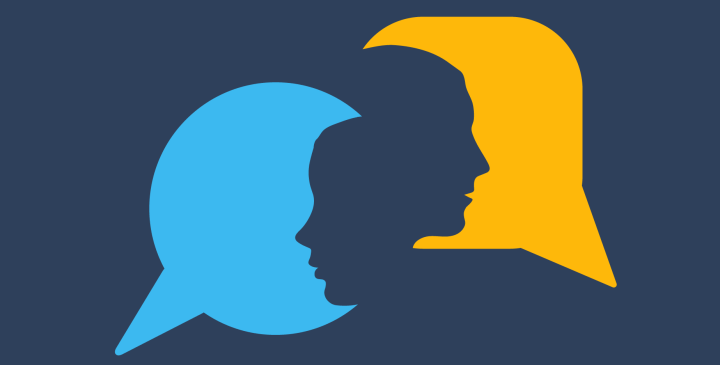
About 1 in 5 Americans experience at least one microaggression daily. While not usually overt, microaggressions are subtle acts of racism. And, despite their name, there’s nothing small about their impact.
In 2021, the Centers for Disease Control and Prevention declared racism a public health threat, recognizing that racism underlies many health inequalities, including overall poorer health and worse access to health care among minoritized people. Microaggressions may be racism’s latest and most widespread form.
UC San Francisco Assistant Professor in Child and Adolescent Psychiatry Chase Anderson, MD, and Assistant Psychiatry Professor Brittany Bryant, LCSW, have witnessed discrimination first-hand inside and outside of the clinic.

Chase Anderson, MD (left) and Brittany Bryant, LCSW (right)
Today, they provide mental health care for children and young adults affected by discrimination, including microaggressions, as part of UCSF ’s Muses Clinic for Minoritized Youth. The clinic serves young people from San Francisco and offers mental health care that equips them to understand and talk about the impact of discrimination on their mental health and provides them with coping tools.
Anderson and Bryant explain microaggressions, what they mean for our health and what to do if we witness one.
What are microaggressions?
Anderson: Microaggressions are behaviors that disempower minoritized people. They’re everyday spoken or unspoken snubs or insults, intentional or not, that communicate hostile or negative messages to a person based solely on their membership among a minoritized group of people. This could be based on:
- Race
- Ethnicity
- Gender identity
- Economic status
- Ethnicity
- Country of origin
- Religious affiliation
- Sexual orientation
- Disability status
Bryant: Microaggressions typically come from a source who has more societal power than the target. In the U.S., that might be a white person towards a person of color or a heterosexual person towards a member of the LGBTQ+ community. In health care, the same dynamics can be present in a doctor-patient relationship.
What are some examples of microaggressions?
Anderson: There are three types of microaggressions: microinvalidations, microinsults and microassaults.
Microinvalidations
Comments, often unconscious, that negate or dismiss a person’s lived experience. These are often the most common form of microaggression. Examples can include calling a woman “sweetie” or refusing to accept that race and prejudice shape our daily lives by saying comments like “I don’t see color,” or “Anyone can succeed if they work hard enough.”
Microinsults
Subtle, demeaning remarks that are often unconscious, like saying someone is only in their position because of affirmative action or assuming a patient won’t take their treatment as prescribed because of their socioeconomic background.
Microassaults
Often conscious are offensive verbal or nonverbal attacks, for example, name calling, mocking someone’s cultural norms or refusing to be treated by a Black clinician.
How do microaggressions affect our health?
Bryant: Microaggressions are like a death by 1,000 cuts. For people who don’t have to experience them regularly, they might be tempted to think it’s easy to get over a single insult. What they might not understand is that, with repeated exposure to microaggressions, we begin to internalize them, and they begin to shape the way we see the world and ourselves.
Experiencing microaggressions can lead to worse physical and mental health and lower quality of life, including higher risks for:
- Chronic stress
- High blood pressure
- Gastrointestinal issues
- Sleeping problems
- Anxiety
- Depression
- Post-traumatic stress disorder
- Obsessive-compulsive disorder
- Substance use disorder
- Low self-esteem
- Suicide
How do microaggressions influence health care?
Anderson: Microaggressions stop people from seeking out treatment because they undermine trust among minoritized patients, who, as a result, may avoid care. Or, when people do seek care, they might leave care early.
How can I respond if I see someone commit a microaggression?
Anderson: A big thing about helping address microaggressions is to set limits. Target the behavior, not the person. Studies have shown that if people feel attacked, they are more likely to double down and become defensive. If you focus on the behavior and why it bothered you, it actually creates a more dynamic atmosphere where there is the possibility for change.
Some potential responses to witnessing a microaggression are:
"I just noticed this behavior happen, and it could affect people in the room in this kind of way. Was there a reason that was said?”
Or:
"I don’t agree with that behavior. Let’s not use it.”
Think about circling back to the person who committed the microaggression, if you feel it’s safe and you’re not burdened to do so:
"Hey, we just had to have a pretty serious conversation about some things. How did that land? What are your thoughts now? And how do we move forward effectively?”
How can I support someone who was a target of a microaggression?
Consider checking in with the person later to see how they feel, remembering to give them an “out” if they’re not ready to speak:
"I wanted to check to see how you were feeling, but I know this question could be triggering for you. I wanted to let you know that you don’t have to answer this question, but I’m here if you want to talk as time goes on.”
What can I do if I experience a microaggression?
Anderson: Freezing in the moment is a normal response to discrimination, and you may be unable to respond immediately. That’s okay. If it helps, you can practice ahead of time what you might say if you experience a microaggression. Maybe something like:
"What you said made me uncomfortable. I’m going to step away from this conversation.”
When you experience discrimination, it’s important to have someone you can talk openly with to help you process your emotions. That’s why building a community around you, especially if you are minoritized, is important and can play a role in reducing the risk of negative mental health impacts.
What can I do if I commit a microaggression and it’s brought to my attention?
Bryant: Colleagues from UC Davis have recommended five steps:
- Acknowledge your bias
- Seek feedback from the person affected
- Say you’re sorry
- It’s the impact of your actions that matters, not your intent
- Say, thank you for the feedback.
About UCSF Psychiatry and Behavioral Sciences
The UCSF Department of Psychiatry and Behavioral Sciences and the Langley Porter Psychiatric Institute are among the nation's foremost resources in the fields of child, adolescent, adult, and geriatric mental health. Together they constitute one of the largest departments in the UCSF School of Medicine and the UCSF Weill Institute for Neurosciences, with a mission focused on research (basic, translational, clinical), teaching, patient care, and public service.
UCSF Psychiatry and Behavioral Sciences conducts its clinical, educational, and research efforts at a variety of locations in Northern California, including the UCSF Nancy Friend Pritzker Psychiatry Building; UCSF Langley Porter Psychiatric Hospital; UCSF Medical Centers at Parnassus Heights, Mission Bay, and Mount Zion; UCSF Benioff Children’s Hospitals in San Francisco and Oakland; Zuckerberg San Francisco General Hospital and Trauma Center; the San Francisco VA Health Care System; UCSF Fresno; and numerous community-based sites around the San Francisco Bay Area.
About the UCSF Weill Institute for Neurosciences
The UCSF Weill Institute for Neurosciences, established by the extraordinary generosity of Joan and Sanford I. "Sandy" Weill, brings together world-class researchers with top-ranked physicians to solve some of the most complex challenges in the human brain.
The UCSF Weill Institute leverages UCSF’s unrivaled bench-to-bedside excellence in the neurosciences. It unites three UCSF departments—Psychiatry and Behavioral Sciences, Neurology, and Neurological Surgery—that are highly esteemed for both patient care and research, as well as the Neuroscience Graduate Program, a cross-disciplinary alliance of nearly 100 UCSF faculty members from 15 basic-science departments, as well as the UCSF Institute for Neurodegenerative Diseases, a multidisciplinary research center focused on finding effective treatments for Alzheimer’s disease, frontotemporal dementia, Parkinson’s disease, and other neurodegenerative disorders.
About UCSF
The University of California, San Francisco (UCSF) is exclusively focused on the health sciences and is dedicated to promoting health worldwide through advanced biomedical research, graduate-level education in the life sciences and health professions, and excellence in patient care. UCSF Health, which serves as UCSF’s primary academic medical center, includes top-ranked specialty hospitals and other clinical programs, and has affiliations throughout the Bay Area.





